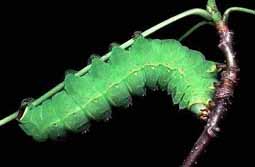
Actias luna is one of the most trouble free silkmoths to rear.
Strongly recommended for beginners.
Does well indoors or out.
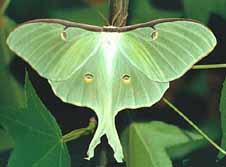
All materials listed can be ordered via email to Bill Oehlke at oehlkew@islandtelecom.com or via regular mail:
Bill Oehlke
Box 476, 155 Peardon Road
Montague, Prince Edward Island,
Canada C0A 1R0
Phone: 902-838-3455; I am in time zone east of New York. Please consider time differences if phoning; 9:00 pm in New York is 10:00 pm on Prince Edward Island. I check my email several times each day and prefer to correspond that way.
Most cocoons, pupae and butterfly chrysalids (extensive listing near bottom of page) are sold out for season and won't be available until fall of 2004, but there are still (March 1, 2004) some cecropia, cynthias and possibly polyphemus available. Confirm availability before ordering. Cocoon prices are now near bottom of this page.
Always confirm availability of stock, preferably by email, before sending payment. Livestock only is/will be available. Dead specimens usually are not sold, but you can make requests now for upcoming season. Wild males only would be saved for you.
Order early before supplies are depleted.
Eggs can be ordered any time after March 1, 2004 and will
be shipped on a first-paid-first-served basis, starting late May
into early July (late July-early August for cynthia).
Please post date checks for eggs for July 1, 2004. I do not cash checks until eggs
have been shipped. Online help is available, but first please
read the following article:
Egg Care
Personal checks are preferred method of payment. No credit cards. Shipping is worldwide.
There is a discount of approximately 10% on most
items (cocoons, chrysalids, rearing sleeves and pupae) for all members
of the WORLD'S LARGEST SATURNIIDAE SITE club. Details at
http://www.silkmoths.bizland.com/indexos.htm
Members' prices are printed in red. I cannot
discount on the high shipping costs (Approx. $7.00/shipment to U.S. for EXPRESS postage).
Species: | price: 12 eggs | price: 24 eggs | price: 36 eggs |
I maintain some eggs from each batch for control. Only rarely does it happen that eggs do not hatch due to infertility (male was probably spent). In such cases, a second shipment (not Express) will be attempted if early enough in season or a credit will be applied toward a fall cocoon purchase. Cocoon credit does not include the lost $7.00 EXPRESS shipping fee.
 | Actias luna is one of the most trouble free silkmoths to rear.Strongly recommended for beginners. Does well indoors or out. |  |
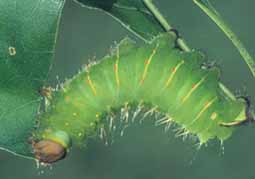 | Caterpillars of Antheraea polyphemus get quite chunky and consume much foliage.Oak is preferred. Easy to rear. | 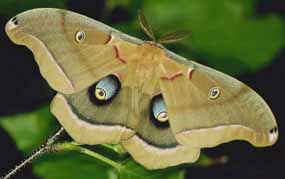
|
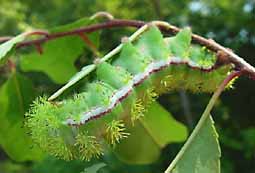 | Ouch! Automeris io larvae feed in groups and can give a nasty sting.Larvae do extremely well on most fruit trees and actually eat just about everything. | 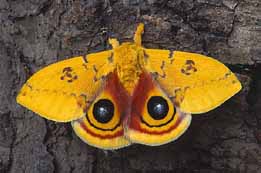 |
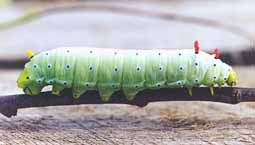 | Callosamia promethea larvae do extremely well on cherry, spicebush and sassafras. Their stoutness and "horns" suggest rhinos. | 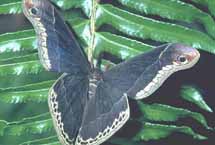 |
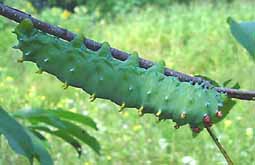 | Hyalophora cecropia is one of north America's largest and most beautiful silkmoths.Larvae get humongous! Fruit tree foliage, especially cherries, is preferred. | 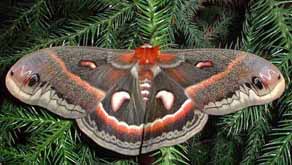 |
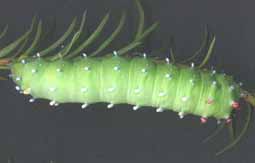 | Hyalophora columbia closely resemble cecropia. Larvae have three sets of red tubercles and accept willow and cherry species as well as the preferred juniper/tamarack/larch. | 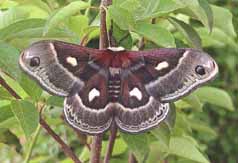 |
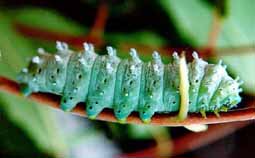 | Samia cynthia was introduced into U.S. in late 1800's to establish a silk industry. Populations are in Connecticut, New York, New Jersey. Larvae prefer ailanthus, but accept a variety of other hosts. | 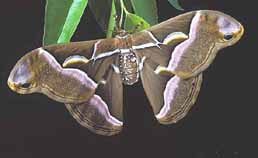 |
Please read Egg Care before ordering.
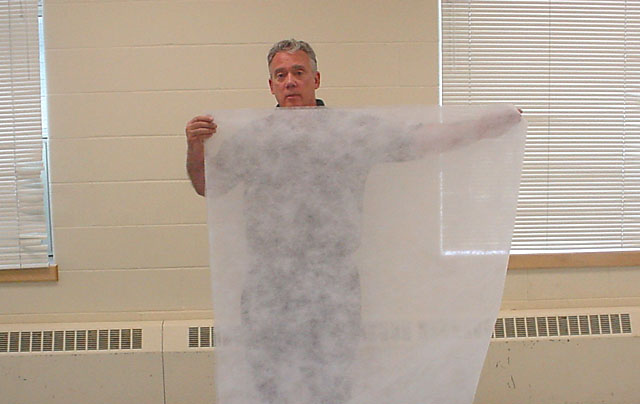
Above, you are looking through two layers of remay as I have folded the material in preparation for sewing.
I do almost all my rearing of caterpillars outside in rearing sleeves pulled, like a sock, over tops of small trees or over lateral branches.
Newly emerged caterpillars are inserted onto the live foliage from the open end of the sleeve and then the sleeve is tied shut around the stem.
Remay cloth, the material I use for sleeves, is a light weight, spun-bonded fabric that allows for good sunlight penetration and air circulation. I buy it in 2550 foot long rolls from a garden supply center. It is designed as an outdoor spring garden/farm row cover, so the material is tough and is usually good for two or three seasons.
Sleeves are available in three sizes:
four feet long with 67 inch circumference: $4.00 U.S./sleeve; $3.60 members
six feet long with 67 inch circumferenc: $5.50 U.S./sleeve; $4.95 members
67 inch long with 7.5 feet circumference: $7.00 U.S./sleeve; $6.30 members
Ten percent discount applies for members of WLSS. Shipping charge is dependent upon destination and number of sleeves ordered (weight). Small orders of three sleeves can usually be shipped for about $4.00. Larger orders of twenty or more sleeves usually cost $10.00-$15.00. Ask for quote before sending payment. Sleeves are shipped as soon as payment is received. I use same sleeves to rear literally thousands of Saturniidae, Sphingidae and butterfly larvae each season.
All cocoon/chrysalid/pupae orders must include one $7.00 postage and handling fee for the entire order. Enquire as to availablity, but the following are anticipated for fall of 2004. Checks for livestock should be post dated for October 1, 2004. I ship on first-paid-first-served basis, after payment has been received, and I cash checks, which are stapled into a binder in order of receipt, after shipments have been mailed.
As of March 1, 2004, there are still some cecropia, cynthia and polyphemus left for U.S. destinations only. Email to confirm availability as these limited supplies still remaining will probably sell out quickly.
Prices quoted in red are for members of WLSS.
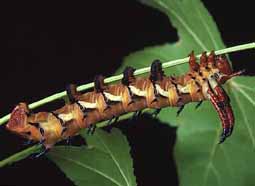 |
Citheronia regalis, the Hickory Horned Devil,
is a real beauty with larvae approaching six inches. | 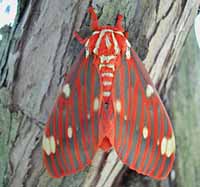 |
 | Actias luna is one of the most trouble free silkmoths to rear.Strongly recommended for beginners. Does well indoors or out. $3.75/cocoon $3.40 |  |
 | Callosamia promethea cocoons hang from trees throughout the winter and are easy to find.Females are brown and call in wild males from 3:00-6:30 pm. $3.75/cocoon $3.40 |  |
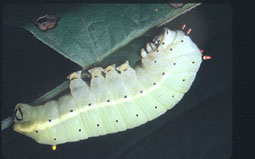 | Callosamia angulifera: The Tulip Tree Moth flies from southern Massachusetts to Florida. Caterpillars feed exclusively on Liriodendron tulipifera (Tulip tree) $6.00/cocoon $5.40 | 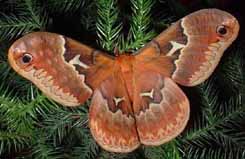 |
 | Cocoons of Antheraea polyphemus are usually available in the fall and winter.
Easy to rear. $4.20/cocoon $3.80 | 
|
 | Samia cynthia was introduced into U.S. in late 1800's to establish a silk industry. Populations are in Connecticut, New York, New Jersey. $4.00/cocoon $3.60 |  |
 | Ouch! Automeris io larvae feed in groups and can give a nasty sting.Females have reddish-brown forewings; males have yellow forewings. $3.75/cocoon $3.40 |  |
 |
Hyalophora columbia
closely resemble cecropia. Larvae have three sets of tubercles
and accept willow and cherry species as well as the
preferred juniper/tamarack/larch. $6.00/cocoon $5.40 |  |
 | Hyalophora cecropia is one of north America's largest and most beautiful silkmoths.Larvae get humongous! $5.60/cocoon $5.00 |  |
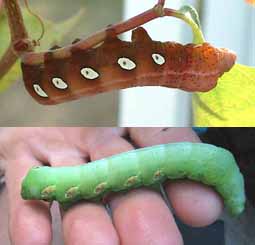 | Eumorpha pandorus, The Pandorus Sphinx, is often seen in larval stage on grape vines or Virginia Creeper.Larvae are striking! They come in green and orangey-brown. $10.00/pair Sold in pairs only, no discount |  |
 |
Ceratomia amyntor, the Four-Horned or Elm Sphinx,
also has two larval forms. The brown one reminds me of a
Scottish Terrier. |  |
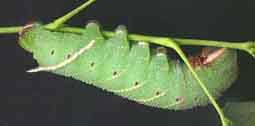 | Pachysphinx modesta,
the Modest Sphinx or Poplar Sphinx, has a heavy body. Larvae are chunky and
not as elongated as some of the other Sphingids. | 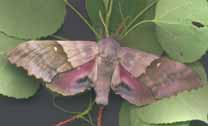 |
 | Paonias excaecata, The Blinded Sphinx, has striking underwings and takes its name from the blurred, blue-gray "iris" in the under wing.Larvae accept birch, oak, cherry! $3.50/pupa $3.15 |  |
 | Darapsa myron, The Virginia Creeper or Grapevine Sphinx, is often seen in larval stage on grape vines or Virginia Creeper.Underwings are bright orange in sharp contrast to the forewings. $3.00/pupa $2.70; |  |
 | Darapsa choerilus (was pholus), The Azalea Sphinx, has striking orange underwings. Green larvae darken just before pupation.Pupae are very active. $3.00/pupa $2.70 |  |
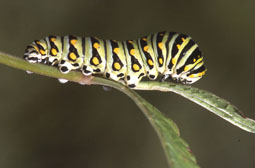 | Black Swallowtail, Papilio polyxenes asterius, larvae are often found in the garden on carrots, parsley, celery and related plants.$4.20/chrysalid $3.80 | 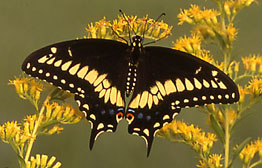 |
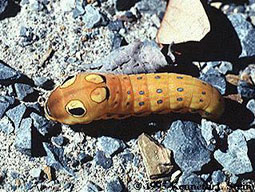 | Spicebush Swallowtail females have powdery blue scales on lower wings; males are adorned wth green scales.Larvae hide by day in a leaf furl. $4.00/chrysalid $3.60 | 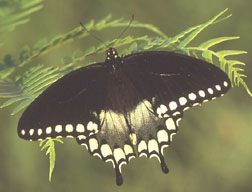 |
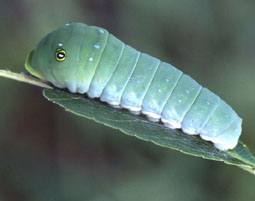 | Tiger Swallowtails like to drink at mud puddles and along river banks as well as nectar at flowers.$4.00/chrysalid $3.60 | 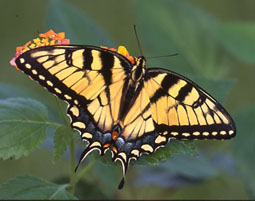 |
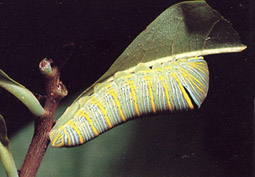 | Zebra Swallowtails are real beauties with strongly contrasting pale yellow (almost white) forewings with black stripes.Larvae feed on pawpaw. $4.40/chrysalid $4.00 | 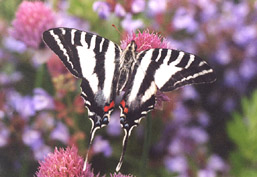 |
1. Winter diapause Saturniidae cocoons/pupae of big, healthy |